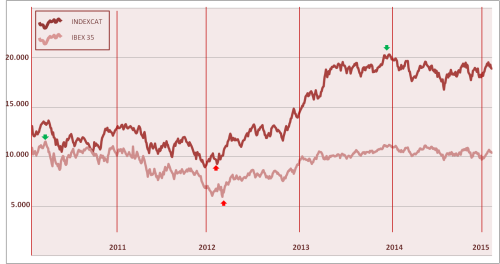My latest for Learn Liberty looks at proposals for starting an equalization program to redistribute from rich to poor states in the U.S. and finds them wanting. Due to the audience for that blog, I kept that post nontechnical and brief. I'll reproduce part of it here and then elaborate on some of the complexities … Continue reading Federalism Isn’t Unfair
Tag: fiscal federalism
The Health Care Shell Game: Why Not Leave Policy to the States?
In my latest blog post for Learn Liberty, I take on arguments against decentralizing health care policy to the states on the grounds of fiscal capacity: So if federal ACA spending were cut or even zeroed out, why couldn’t states that like the legislation simply reinstate the same taxes and spending that the federal government … Continue reading The Health Care Shell Game: Why Not Leave Policy to the States?
Why Catalan Independence Might Be Good for the World
On September 27, Catalonia, an "autonomous community" of Spain, votes in a regional election that will likely determine whether the region declares independence from Spain. The Economist and other global news outlets have generally not taken the movement very seriously, which is a grave mistake. According to a series of new polls, the independentists are … Continue reading Why Catalan Independence Might Be Good for the World
How Decentralized Is Your State?
In the U.S., states have full authority over local government. Some states strictly centralize power and leave local government little to do. For instance, Hawaii has a single school district for the entire state, so that different localities cannot choose to spend different amounts on the government schools. Michigan effectively has a similar system, because … Continue reading How Decentralized Is Your State?
“Fiscal Federalism, Jurisdictional Competition, and the Size of Government”
This paper of mine is now available online in Constitutional Political Economy. It empirically investigates competing theories of how fiscal federalism constrains government. The main conclusion is that different federal systems conform roughly to different theoretical models, with the U.S. - a bit surprisingly - coming closest to "market-preserving federalism." Some of the early findings … Continue reading “Fiscal Federalism, Jurisdictional Competition, and the Size of Government”
Why So Little Decentralization? Part Two: Secession Prevention
Having finally turned the corner on a brutal, 11-day (and counting) cold, I feel up to getting back to my blogging routine. First up: a followup to last month's post, "Why So Little Decentralization?" To review, that post posed a puzzle (a problem for political scientists to ponder, you might say). The puzzle is this: … Continue reading Why So Little Decentralization? Part Two: Secession Prevention
Why So Little Decentralization?
Some of these developing countries are both huge and ethnically and regionally diverse, India and Indonesia most notably. One might think that these governments would have even more reason to decentralize than would the governments of comparatively homogeneous Western democracies. Therefore, the relative lack of decentralization in developing countries remains a puzzle.
Is Decentralization Overrated?
I recently read Daniel Treisman's brilliant book, The Architecture of Government: Rethinking Political Decentralization. This book is particularly important for classical liberals who defend decentralization as an important institutional reform for promoting and protecting individual freedom. Treisman's thesis is essentially that decentralization is overrated. He doesn't argue that decentralization generally has bad consequences, even under … Continue reading Is Decentralization Overrated?
Does Status Quo U.S. Federalism Advantage Progressives?
Is federalism for progressives? Libertarians, who are generally enthusiastic about the competitive federalism model, have tried to argue that the model provides, at the very least, a kind of modus vivendi for all ideological camps, allowing citizens in each state to have roughly the kind of government that they want. Relative to a single national … Continue reading Does Status Quo U.S. Federalism Advantage Progressives?
Two Cheers for the Seventeenth Amendment
Small-government types have often debated whether the 17th Amendment to the U.S. Constitution, establishing direct election of senators, is in part responsible for the decline of federalism in the U.S. I have long been skeptical of the 17th Amendment repeal movement, because Germany has a system in which states (Länder) elect senators (members of the … Continue reading Two Cheers for the Seventeenth Amendment
Federalism & Inequality, Part Two
In my last post on this topic, I described an ideal system of federalism and its advantages and disadvantages. One of the concerns that progressives often have about this kind of federalism, which I wish to take seriously, is that it will lead to a growing gap between the incomes of rich and poor regions … Continue reading Federalism & Inequality, Part Two
Federalism & Inequality, Part One
Constitutional debates swirling around the PPACA's individual mandate have much to do with federalism. The core issue the Supreme Court is addressing is whether the federal government has essentially unlimited authority in economic policy, or whether they are yet some areas of economic policy-making (such as whether to compel commerce) exclusive to the states. As … Continue reading Federalism & Inequality, Part One
Could a Scottish Secession Referendum Bring About Salutary Decentralization?
For all the usual association of independence movements with violence and "separatism," the fact is that secessionist movements in liberal democracies usually pursue their aims peacefully, through the democratic process, and central governments resolve not to use military force to prevent secession authorized by a democratic vote (imagine that!). Such is the case in Scotland, … Continue reading Could a Scottish Secession Referendum Bring About Salutary Decentralization?
Who Killed Local Autonomy in the U.S.?
Once upon a time, local governments accounted for the lion's share of economic policy-making in the United States. Before World War I, not only was the federal government's economic policy-making activity strictly limited to areas such as international trade, management of federal lands, trust-busting, and food and drug regulation, but state governments themselves were also … Continue reading Who Killed Local Autonomy in the U.S.?






